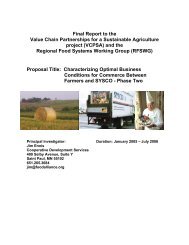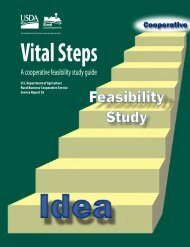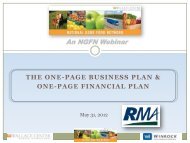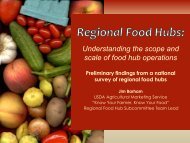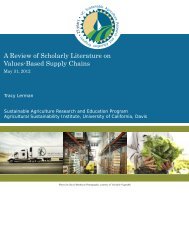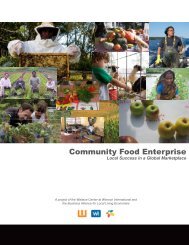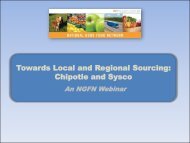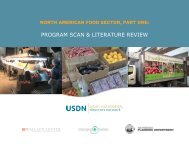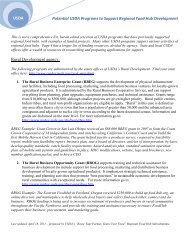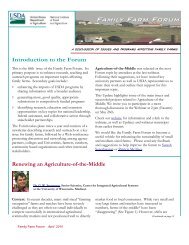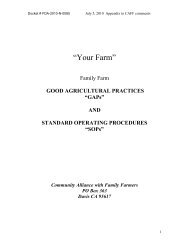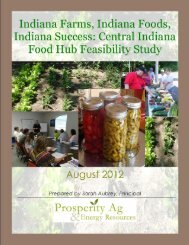The Common Market Feasibility Study - Agricultural Marketing Service
The Common Market Feasibility Study - Agricultural Marketing Service
The Common Market Feasibility Study - Agricultural Marketing Service
You also want an ePaper? Increase the reach of your titles
YUMPU automatically turns print PDFs into web optimized ePapers that Google loves.
THE COMMON MARKET FEASIBILTY STUDYExecutive Summary19Conclusions & Recommendations<strong>The</strong> <strong>Common</strong> <strong>Market</strong> model, born out of the collective desire of Philadelphia-based individuals andorganizations to impact the supply constraints of local food, has been demonstrated through this studyto be both feasible and in great demand. This project has the potential to significantly expand theamount of food grown and consumed within the Philadelphia region simultaneously improving the foodsecurity of consumers while enhancing the viability of local farm communities. While the demand forthis model of values-based distribution holds great potential, the implementation of the business willprove challenging while project partners balance the group's social mission and the need to operate afiscally efficient, low margin enterprise.After conducting market research to find a comparable operating model, the study team found no otheroperation that perfectly mirrored the <strong>Common</strong> <strong>Market</strong> platform. This created a challenge for the studyteam which had to draw more assumptions while testing the financial viability of the business. It alsoallowed the study team to shift certain aspects of the business in response to the research, extractingbest practices from numerous different yet successful models and bending the CM model to betterserve supply and demand-side stakeholders. <strong>The</strong> core value proposition and proposed service of the<strong>Common</strong> <strong>Market</strong> was widely regarded by interview participants to be the "missing link" for thePhiladelphia local food economy. This enthusiastic response coupled with the observation of theprofitable and growing local-organic distribution model suggests strong market opportunity for the<strong>Common</strong> <strong>Market</strong>. It is the hope of the project partners that the model will prove to be replicable inother markets.Demand sector analysis provided affirmation of the project partners' identification of need for the<strong>Common</strong> <strong>Market</strong>. While most respondents indicated a commitment to purchasing locally, the barriersto doing so seemed to multiply in correlation to the quantity of food purchased. Herein lies one of thegreatest market niche opportunities for the project. Being able to meet the stringent licensing,regulatory and insurance requirements will open significant sales channels. <strong>The</strong> ability to source andconsolidate all products currently grown locally will create significant competitive advantage for adistributor seeking to serve the institutional clientele. With this said, it may behoove the <strong>Common</strong><strong>Market</strong> to limit its sales to fruits and vegetables at start-up due to lower regulatory hurdles. Allcategories of buyers expressed the need to have a year-round supply of product. This will necessitateboth season-extending efforts locally and relationships with like-valued growers in warmer climates.Fair-trade sourcing should be considered to round out product offerings.<strong>The</strong> most important attribute of any food distribution enterprise should be reliability- both in deliveryand quality. For this reason the ability of this business to grow and maintain strong buyer relationshipswill hinge upon its supply network. While wholesale demand is strong and growing, the historic absenceof a distributor like the one proposed in this study has allowed demand to significantly outstrip supply.Adopting a slow-growth approach to sales will be important while the <strong>Common</strong> <strong>Market</strong> buildsrelationships with farmers and fine-tunes logistics. <strong>The</strong> nascent effort should never promise what itcannot provide. <strong>The</strong> <strong>Common</strong> <strong>Market</strong>'s reliability to its customers must also match paymentconsistency with farmers if it is to earn their trust and long-term commitment.



